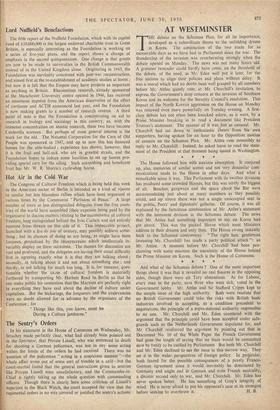T HE debate on the Schuman Plan, for all its importance,
developed as a subordinate theme to the unfolding drama in Korea. The conjunction of the two made for as memorable days as we have had in Parliament since the war. The thunderclap of the invasion was reverberating strongly when the debate opened on Monday. The news was not many hours 'old. A grimmer reminder could hardly have come, on the threshold of the debate, of the need, as Mr. Eden well put it later, for the free nations to align' their policies and plans without delay. It was a moral which had no doubt been well grasped by all members before Mr. Attlee quietly rose, at Mr. Churchill's invitation, to express the Government's deep concern at the invasion of Southern Korea and its welcome for the Security Council's resolution. This impact of the North Korean aggression on the House on Monday was renewed even more powerfully on Tuesday evening. A first- class debate has not often been knocked askew, as it were, by a Prime Minister breaking in to read a document like President Truman's statement. The manner of it was just as unusual. Mr. Churchill had sat down to enthusiastic cheers from his own supporters, having spoken for an hour to the Opposition motion of censure on the Schuman Plan. Mr. Attlee rose ostensibly to reply to Mr. Churchill. Instead, he asked leave to read the state- ment of the President at that moment being issued in Washington.
* * * * The House followed him with anxious absorption. It conjured up, alas, memories of similar scenes and not very dissimilar com- munications made to 'the House in other days. And what a remarkable scene it was. This Parliament with its swollen divisions has produced some crowded Houses, but this was surely the biggest of all. Benches, gangways and the space about the Bar were accommodating just about as many members as they possibly could, and up aboye there was not a single unoccupied seat in the public, Peers' and diplomats' galleries. Of course, it was all explained by the fortuitous combination of Mr. Attlee's statement with the imminent division in the Schuman debate. The news that Mr. Attlee had something important to say on Korea had got about. This was the packed House which most Ministers address in their dreams and only then. The House swung instantly back to the Schuman controversy. " The right hon. gentleman (meaning Mr. Churchill) has made a party political attack ": so Mr. Attlee. A moment before Mr. Churchill had been pro- claiming with some emotion the unanimity of the House behind the Prime Minister on Korea. Such is the House of Commons.
* * * * And what of the Schuman debate ? One of the most important things about it was that it revealed no real fissures in the opposing sides, though there were six Tory abstentions. As for Labour, every man in the party, save three who were sick, voted in the Government lobby. Mr. Attlee and Sir Stafford Cripps kept to the simple issue of the high authority. Both were resolute that no British Government could take the risks with British basic industries involved in accepting, as a condition precedent to negotiations, the principle of a supra-national authority responsible to no one. Mr. Churchill and Mr. Eden countered with the argument that the principle could have been accepted under safe- guards such as the Netherlands Government stipulated for, and Mr. Churchill reinforced the argument by pointing out that in Document No. 10 of the White Paper the French Government had gone the length of saying that no State would be committed save by treaty to be ratified by Parliaments. But both Mr. Churchill and Mr. Eden declined to see the issue in this narrow way. They set it in the wider perspectives of foreign policy. In particular, both feared for the possible consequences of a purely Franco. German agreement since it would inevitably be dominated by Germany and might end in German and even French neutrality, a disaster second only to war, said Mr. Churchill. Mr. Eden has never spoken better. He has something of Grey's integrity of mind. He is never afraid to put his opponent's case at.its strongest before seeking to overthrow it. H. B.














































 Previous page
Previous page